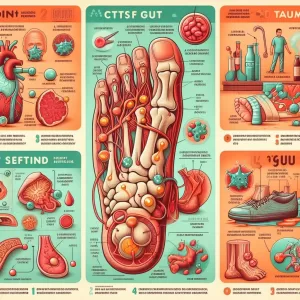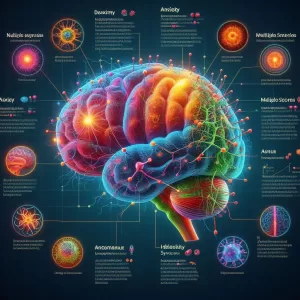ما هو التهاب المفاصل التفاعلي؟
**Question: What is Reactive Arthritis?**
**Answer:**
Reactive arthritis, also known as Reiter’s syndrome, is a type of inflammatory arthritis typically triggered by an infection outside of the joints, most commonly a bacterial infection. It is characterized by joint pain, swelling, and stiffness, often accompanied by other symptoms such as urinary issues, eye inflammation (conjunctivitis), and skin or nail abnormalities.
**Causes and Triggers**
Reactive arthritis is not caused directly by the infection itself but an abnormal immune response to the invading microorganism. Common triggers include:
* Bacterial infections, such as Chlamydia, Salmonella, Shigella, or Yersinia
* Urethritis, a urinary tract infection, especially caused by Chlamydia
* Sexually transmitted diseases (STDs)
* Gastrointestinal infections, such as food poisoning
* Recent vaccinations
**Symptoms**
The main symptoms of reactive arthritis are:
* Joint pain and stiffness, particularly in the knees, ankles, or heels
* Eye inflammation (conjunctivitis), redness, and irritation
* Urinary problems, including pain, burning, or frequent urination
* Skin and nail changes, including nail pitting, rashes, or plaques
* Back pain
* Fatigue
* Fever
* Loss of appetite
**Diagnosis and Treatment**
Diagnosis of reactive arthritis often involves ruling out other causes of arthritis and identifying the underlying infection. Tests may include blood tests, joint fluid analysis, and imaging studies such as X-rays or MRIs.
Treatment typically focuses on managing symptoms and preventing complications. Medications include:
* Nonsteroidal anti-inflammatory drugs (NSAIDs)
* Disease-modifying antirheumatic drugs (DMARDs)
* Antibiotics, if a specific bacterial infection is identified
Physical therapy, lifestyle modifications, and complementary therapies may also be beneficial.
**Prognosis**
The prognosis for reactive arthritis varies. Symptoms often improve within weeks or months after the underlying infection is treated. However, some people may experience persistent symptoms or complications, such as joint damage and eye inflammation. Early diagnosis and treatment can help optimize outcomes.
**Other Important Information**
* Reactive arthritis is more common in men than women.
* It typically affects individuals between the ages of 20 and 40.
* Genetics may play a role in its development.
* There is no cure for reactive arthritis, but treatments can effectively manage symptoms and prevent complications.
* Regular follow-up with a healthcare professional is crucial to monitor progress and adjust treatment accordingly.
تعليق واحد
اترك ردّاً
المقالات الشعبية








What is Reactive Arthritis